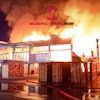
ALBUQUERQUE, N.M. (AP) — New Mexico has reached a settlement with the U.S. Department of Energy over the renewal of a permit for the federal government's only underground repository for nuclear waste.
Officials with the New Mexico Environment Department announced Tuesday that an agreement was reached last week after four days of negotiations. The state first outlined its terms in December, seeking to ensure that high-level waste such as diluted plutonium wouldn't find its way to the state.
The Waste Isolation Pilot Plant in southeastern New Mexico plays a key role in the nation's multibillion-dollar effort to clean up radioactive waste left behind by decades nuclear research and bomb-making. Currently, it's licensed to take what is known as transuranic waste, or waste generated by the nation's nuclear weapons program that is contaminated with radioactive elements heavier than uranium.
The new draft permit would provide greater regulatory oversight and safeguards at the repository over the next decade, officials said. It also would prioritize the cleanup of Cold War-era waste at Los Alamos National Laboratory — the birthplace of the atomic bomb.
"The new permit conditions affirm New Mexico's authority and position that all roads lead from WIPP — we are no longer the last stop for clean-up but the driving force in that process that begins here," said James Kenney, head of New Mexico's Environment Department.
The state agency expects to publish the modified permit on Aug. 15. A public meeting will follow in September, with a final permit being issued in October.
Nuclear watchdog groups said they were in support of the agreement because it focuses on the waste at Los Alamos and requires more transparency about legacy defense-related waste around the U.S.
The permit also includes language that would enable the state to suspend shipments to WIPP if there's evidence of a threat to human health or the environment.
New Mexico also could move to revoke the permit if Congress were to increase WIPP's capacity or expand the types of waste that could be sent there. State officials and watchdogs have said that language serves as a hedge against New Mexico becoming the nation's permanent dumping ground.
Under the permit, the Energy Department would have to document its progress in siting another underground repository in a state other than New Mexico through a new annual report as well as hold quarterly meetings to update the public.






















